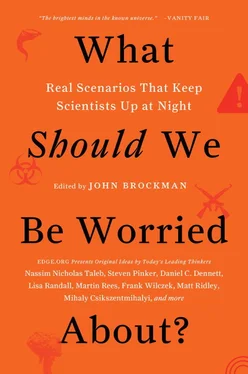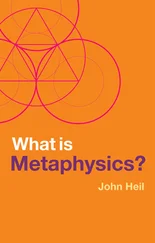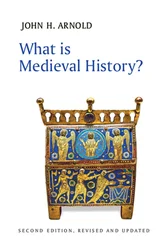LAWRENCE M. KRAUSS
Physicist/cosmologist; director, Origins Project, Arizona State University; author, A Universe from Nothing
You might think that the fact that we live in a relatively quiet suburb of an average galaxy in an apparently uniform universe 14 billion years after the Big Bang would not be large source of worry. However, lately it has been worrying me.
Thanks to the two pillars of 20th-century physics, relativity and quantum mechanics, we now know that the information we can obtain about the universe is limited by our particular circumstances—although these don’t really put strict limits on what is ultimately empirically knowable. There may be, however, new limits looming on our ultimate ability to probe nature—limits made manifest by the truly remarkable successes of physical theory and experiment in the past fifty years. Again, the limits are a consequence of our circumstances; at least in principle, they could change the way fundamental science may progress in the future.
In the first place, current physical theories suggest that our universe is probably not unique. Well beyond our ability to directly probe, there may be an infinity of universes, with differing laws of physics and perhaps different characteristics of space and time. This is not necessarily a problem if we’re interested in understanding the nature of our particular universe. But it could be that the laws of physics are probabilistic and there’s no fundamental reason why they are what they are in our particular universe. Just as an epidemiologist with a single patient can say little about the cause of some condition because it’s impossible to know what’s normal and what isn’t, if we can study only one universe—our own—we may never be able to directly empirically determine whether fundamental laws are indeed fundamental or just accidents. We might be smart enough to derive a theory that explains how the laws of physics are distributed across universes and determines the probability for our particular laws being what they are. But it is equally plausible that without access to a larger sample set, we may never know.
It gets worse. We have discovered that the expansion of our universe is accelerating; the longer we wait, the less we will see of it. Eventually all the galaxies we see now will disappear, and even the evidence of the Big Bang itself will disappear. Although I have argued (unsuccessfully) to Congress that this means we should do cosmology while we still have the chance, we cannot necessarily presume that if we and our intelligent successors keep at it, Nature will reveal more of her secrets.
The very cause of the acceleration may never be possible to pin down. If empty space has energy, then this energy can cause the observed acceleration. But as there is no known laboratory experiment that can probe this energy, our only recourse is to observe the expansion over time. A constant rate of acceleration is consistent with an energy associated with purely empty space, but it is also consistent with a host of other possible sources of trapped energy in some otherwise invisible fields. We may never have a way of knowing. And if this energy is directly associated with the properties of empty space, we may never know why, because that, too, may be an accident, with different energies in different universes. Given just a single universe to probe, we may never know.
As long as we’re in the mood for worrying: Even the apparent discovery of the Higgs boson at the Large Hadron Collider (a finding that validates the most remarkable intellectual journey humans have ever embarked on) may yield frustration on the horizon. So far, just the Higgs has been seen. But the Standard Model has a host of weirdnesses, and a plethora of physics ideas have been proposed to explain them. Most of these ideas suggest some new physics that will be seen at the LHC. But what if the Higgs is all that is seen? Then we will have no guidance on where to turn to resolve the underlying puzzles of the Standard Model. If Nature is not kind, the resolution of these problems may well be at a distance and energy scale that is simply unattainable, either because of practical physical constraints or the constraints imposed by small-minded politicians.
Perhaps then, at the extremes of scale, empirical science will reach its limits and we will be reduced to arguing about what is plausible, instead of testing our ideas. I hope this won’t be the case. I wouldn’t bet on it, either. After all, every time we open a new window on the universe we’re surprised, and there are many windows left to open. Whereas worrying helps prepare the mind, I don’t believe that any of these possible limits will lead to the end of science itself—or even the end of physics, as naysayers have proposed. There are enough remarkable and perplexing aspects of the universe which we can still measure to keep us going for a long time.
THE DANGEROUS FASCINATION OF IMAGINATION
CARLO ROVELLI
Theoretical physicist, Centre de Physique Theorique de Luminy, Marseille; author, The First Scientist: Anaximander and His Legacy
Worries about imagination might seem odd in a context like Edge , where intelligent creativity shines. I myself have often praised visionary imagination and those who can think what nobody else could. But I worry that free imagination is overvalued and carries risks. In theoretical physics, my field, technical journals are replete with multiuniverses, parallel dimensions, scores of particles nobody has ever seen, and so on. Physicists often look down on philosophers, but they are influenced by philosophers’ ideas more than they admit. Most have absorbed from Popper, Kuhn, Feyerabend, and other philosophers the idea that science advances by throwing away the past and entertaining novel visions.
The heroes are Copernicus, who dared to send Earth flying around the sun, and Einstein, who dared to imagine space as curved and fused with time. Copernicus and Einstein turned out to be right. Will the current fantasies be equally successful? I feel a strange sense of unease. It is one thing to have ideas; it is another to have good ideas. There is value in producing ideas. There is value in screening them.
A number of my colleagues in theoretical physics have spent their life studying a possible symmetry of nature called supersymmetry. Experiments in laboratories, such as Geneva’s CERN, seem now to be pointing more toward the absence than the presence of this symmetry. I have seen lost stares in the eyes of some colleagues: “Could it be?”—how dare nature not conform to our imagination?
The task of separating the good thoughts from the silly ones is hard, of course, but this is where intelligence matters: What should be nurtured? Today many say that, after all, there are no “good ideas” or “bad ideas”—that all ideas can be good. I hear this in philosophy departments from very smart colleagues: “Every idea is right in its own context” or “We don’t have to suppress ideas that might turn out to be better tomorrow” or “Everything is better than lack of creativity.” We often have to choose between realizing that we do not know or making up pretty stories. To a large extent we live in narrations that we weave ourselves. So why not just go for the sweetest of these? After we have freed ourselves from the close-mindedness of the past, why not feel free? We can create enchanting explanations, images of ourselves, of our great country, of our great society. We can be fascinated by our dreams.
But something tells me we should worry. We live in a real world, where not all stories are equally good, equally effective. One dream out of many is the good one. Few explanations are the correct one. Einstein used to say, “I have no special talents. I am only passionately curious.” His curiosity led him to find the diamonds on the dusty shelves, not dreams out in the blue sky. The difficulty is that more often than not, our wild imaginations turn out to write poor drafts with respect to the surprising variety of reality.
Читать дальше












